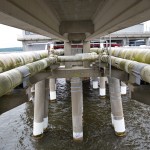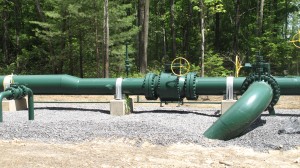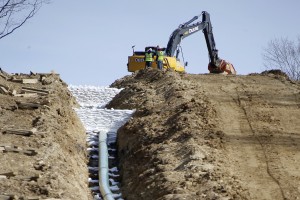Anti-fracking activist and gas company head back to court

Katie Colaneri/StateImpact Pennsylvania
Scroggins and her attorneys talk to reporters outside a court hearing in March.
63-year-old anti-fracking activist Vera Scroggins will be back in court next week facing fines and possible jail time in an ongoing fight with one of Pennsylvania’s biggest gas drillers, Cabot Oil & Gas.
Cabot wants Scroggins to be held in contempt of court for allegedly violating an order to stay away at least 100 feet away from its work sites. A hearing is scheduled for next Wednesday in Susquehanna County.
Scroggins maintains her innocence.
“I just hope to be cleared of the charges and be a free person like anyone else in my county,” she says. “I want to be able to move through all the public roads here without having to worry about counting my steps.”
Scroggins has been a thorn in the company’s side for years. She frequently gives unofficial tours of drilling sites and carries a video camera. Cabot says she has repeatedly trespassed on its property, and her activities pose a safety risk to workers and visitors.
In a motion filed last week, Cabot attorney Amy Barrette claims Scroggins came within 10 feet of an access road to a well site.
“Ms. Scroggins’ conduct constitutes a blatant disregard for this Court’s Order,” wrote Barrette. “Such a flagrant violation of the clear terms of this Court’s Order must not go unchecked.”
The company is also seeking to have Scroggins cover its attorneys fees. A Cabot spokesman did not respond to requests to comment.
The feud made international news earlier this year, after Cabot got a judge to agree to bar her from all the land it owns or has leased. The restrictions went beyond blocking her from operational work sites. The prohibited area included large swaths of land the company has leased but not developed– encompassing public spaces like restaurants, grocery stores, and a hospital. It amounted to nearly 40 percent of Susquehanna County. Cabot later said it didn’t intend for the order to be so broad.
DEP fines pipeline company more than $300,000
The state Department of Environmental Protection has levied a $306,570 fine against a Texas pipeline company for multiple violations involving construction of two gas pipelines in 2012 and 2013.
According to the DEP, the flawed work was performed by PVR Marcellus Gas Gathering LLC of Williamsport. That company was later acquired by Regency Marcellus Gas Gathering of San Antonio, Texas.
“Many of these violations occurred over a significant period of time,” DEP Director of District Oil and Gas Operations John Ryder said in a statement. “We expect that Regency has made operational changes to avoid problems of this nature during future pipeline construction projects.”
DEP oversight of pipelines is limited to matters related to water quality (for example, a stream crossing) and issues with erosion and sedimentation.
Legislature OKs bill requiring more frequent gas production reports

Joe Ulrich/ WITF
A natural gas well in Lycoming County. Under current law, companies report gas production figures twice a year. This bill would require monthly reporting.
A bill approved by the state House and Senate would change the way drillers report gas production figures. The measure now awaits Governor Corbett’s signature.
Under current state law, gas companies have to file reports twice a year with the state Department of Environmental Protection (DEP). House Bill 2278 would require monthly production reports– a common practice among other major gas-producing states.
Transparency around gas production figures has become a sore point for some landowners who have questioned the accuracy of their monthly royalty payments. Since royalty checks are typically distributed on a monthly basis, it has been difficult for landowners to verify the information they receive from gas companies with the bi-annual gas data posted on DEP’s website.
The U.S. Energy Information Administration (the statistics arm of the federal Department of Energy) has also said monthly reporting in Pennsylvania would make its job easier.
First responders in Philadelphia prepare for oil train accidents

Emma Lee/NewsWorks
Philadelphia's first responders react to a simulated oil train derailment during an exercise at the Philadelphia Fire Academy.
Officials from at least seven government agencies, the railroad CSX and the refinery in South Philadelphia responded to a faux fiery train accident on a rail bridge in the city’s downtown Friday morning.
While there was no real emergency, the scenario was based on a minor derailment that happened in January that left six tanker cars intact, but leaning across the Schuylkill Arsenal Bridge.
The Philadelphia Fire Academy buzzed with activity as officials wearing badges from a variety of local, state and federal agencies made radio calls and worked in units to evacuate residents within a half mile of the hypothetical accident scene.
A picture of a crude oil tanker engulfed in flames was displayed on a screen at the front of the room. A coordinator with a microphone called out new details and told officials to stand by for more information.
It was one of several training exercises that have taken place in Pennsylvania and across the country as an increase in accidents involving these oil trains has prompted emergency officials to make sure first responders are prepared. According to a spokesman for CSX, a similar training is planned for next week in Bucks County.
“It’s critically important that we do it here in a simulated scenario rather than try to figure all of this out in an actual emergency,” said Joe Sullivan, Chief Inspector of Homeland Security and Counterterrorism with the Philadelphia Police Department.
As many as 75 trains hauling crude oil from the Bakken Shale in North Dakota roll through Pennsylvania each week on their way to refineries on the East Coast.
Attorneys advise landowners to get involved in pipeline plan
More than 200 people turned out for a meeting in Lancaster Thursday night to discuss a proposed interstate natural gas pipeline. The forum was aimed at educating landowners about how to handle a pipeline on their property.
The project has sparked significant controversy. Attorneys were on hand to discuss ways landowners can negotiate with a pipeline company and deal with regulatory agencies.
Oklahoma-based Williams Partners is seeking to build 177 miles of new pipeline through 10 Pennsylvania counties in an effort to bring Marcellus Shale gas southward to markets along the East Coast. Williams needs the approval of the Federal Energy Regulatory Commission (FERC) to go forward with the project.
Washington D.C.-based attorney Carolyn Elefant represents landowners in pipeline cases and says it’s important for people to educate themselves and get involved early in the process. She spoke with StateImpact Pennsylvania.
Fracking in Texas helps the state’s public school fund top Harvard’s endowment

Mike Fuentes / AP
Lenny Rodriguez works on a Choice Exploration Inc. natural gas rig near Devers, Texas. Drilling on state lands has helped create the largest public school endowment in the country.
A fund that collects rents and royalties from oil and natural gas development to Texas public schools recently became the largest education endowment in the country.
The publicly run endowment, called the Permanent School Fund, is worth $37.7 billion dollars. That’s $1.3 billion more than Harvard University’s $36.4 billion endowment. Jim Suydam, a spokesperson for the Texas General Land Office, says a big part of the story is the shale gas boom.
“We’re making a ton of money off natural gas,” said Suydam. “We made over a billion last year. The shale plays are huge down here. You can see them from space.”
Suydam says that from 1874 to 2003, $7.9 billion was deposited into the fund. Since 2003, just before the shale gas boom began, oil and natural gas has helped increase the endowment by $8.1 billion. These deposits have generated enough return on investments to bring the grand total close to $40 billion. The Permanent School Fund doesn’t cover all expenses for Texas school children, but Suydam says it contributes an average of $400 per student per year. It also backs bonds by local school districts, allowing them to get a triple-A rating. Continue Reading
Environmentalists seek to halt construction at Cove Point LNG export plant

Lindsay Lazarski / WHYY/Newsworks
Dominion's offshore loading platform at Cove Point. Lusby, Maryland. Dominion wants to start exporting LNG from this platform.
Environmental groups have filed a motion with the Federal Energy Regulatory Commission (FERC) to stop the current construction of Dominion’s liquefied natural gas export facility in Cove Point, MD. The groups also want FERC to reverse their recent decision approving the plant.
Last month FERC approved Dominion Energy’s plan to transform the Cove Point plant from an import terminal to an export facility, which will ship out more than 5 million metric tons of liquefied natural gas each year. Cove Point is the fourth export terminal approved by the Federal Energy Regulatory Commission, or FERC. It will be the first connected to the Marcellus Shale by pipeline.
Opponents of the plan say the plant will stimulate natural gas drilling in Pennsylvania’s Marcellus Shale, thereby increasing pollution in shale gas communities. Jocelyn D’Ambrosio is an attorney with Earthjustice.
“In neglecting to prepare a thorough review of the environmental impacts of Dominion’s controversial project, FERC is prioritizing the desires of a powerful company over the health and safety of the people of Calvert County, Marylanders, and communities throughout the Marcellus shale region,” wrote D’Ambrosio in a release. Continue Reading
Senate OKs bill allowing legislators to weigh in on carbon plan
The state Senate has passed a measure that will require legislative approval of a state plan to cut carbon emissions.
Under proposed rules recently put forth by the federal Environmental Protection Agency, Pennsylvania will have to cut its carbon emissions by 32 percent over the next 15 years. The federal climate policy will mean major changes for the state’s energy industries. Pennsylvania ranks fourth in the nation for coal production and third for carbon dioxide emissions.
Lancaster groups to hold meeting on proposed pipeline
An informational meeting will be held in Thursday night in Lancaster to discuss a proposed interstate natural gas pipeline that would cut through 35 miles of the county.
The proposed Atlantic Sunrise pipeline would run through 10 Pennsylvania counties, but it’s faced its fierce opposition from people in Lancaster County, who have raised concerns about how it will effect the environment, public safety, and property values.
The pipeline’s initial route would have cut through several of the county’s nature preserves, but in response to public criticism, the Oklahoma-based pipeline company, Williams proposed an alternate route to federal regulators.
The informational public meeting tonight is hosted by the Lancaster County Conservancy and Lancaster Farmland Trust. It’s aimed at helping landowners along the proposed route learn more about the issue.
Pa. legislature passes bill changing buffers for cleanest streams

Katie Colaneri/StateImpact Pennsylvania
Valley Creek is a prized trout stream that feeds into the Schuylkill River and runs through Valley Forge National Historical Park.
A bill eliminating a requirement for 150-foot buffers between new developments and Pennsylvania’s cleanest streams is now headed to Governor Tom Corbett’s desk.
The House passed HB1565 late Wednesday, which makes forested stream buffers an optional tool to other “substantially equivalent” practices that would preserve water quality and prevent erosion and sedimentation in specially protected watersheds. An amendment approved by the Senate earlier this week also requires developers to offset disturbances within 100 feet of a stream by planting a replacement buffer elsewhere in the same watershed.
The law only applies to projects that require stormwater discharge permits and that are adjacent to one of Pennsylvania’s “high quality” or “exceptional value” streams – a small percentage of waterways.






